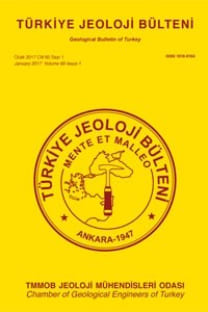Yozgat Bölgesinin Jeolojisi ve Orta Anadolu Masifinin Tektonik Durumu
Bu travayda, 1953 ve 1955 yaz ayları zarfında M.T.A. Enstitüsü namına Yozgat bölgesinde yapmış olduğumuz 1/100.000 ölçekli jeolojik lövelerin ve komplasyon çalışmalarının ilmî neticeleri hülâsa edilmektedir. Ayni zamanda orta Anadolu kristalin masifinin tektonik durumu hakkında Sir E. B. Bailey ve Profesör W. J Mc. Callien tarafından ileri sürülen son hipotezin (1950, 1953) jeolojik vakıalarla ne dereceye kadar bağdaşabileceği münakaşa olunmakta ve masifin etrafına nazaran senklinal bir havza içerisinde bulunması keyfiyeti, Üstkretaseden sonra kuzey Anadolu jeosenklinalinin gittikçe yükselmesi (Laramien safhası) ve bu esnada kristalin masife ait mağmatik intrüzyonların vukua gelmiş olması ile izah edilmektedir. Kanaatimizce, bilinen jeolojik vakıalar, Orta Anadolu masifinin büyük bir şariajla kuzey Anadoludan sürüklenmiş bir nap parçası olduğunu teyit veya isbat edecek durumda değillerdir ve bu suretle de masifin otokton bir kütle olduğu hakkındaki eskiden beri kabul edilen düşüncelerimizi değiştirmek için esaslı bir sebeb yok demektir. Ayrıca Masifin tersier (Alteosen) esnasındaı su üstüne yükselmiş olması, hipotezin ana prensibleri ile tezat teşkil etmektedir.
Anahtar Kelimeler:
Yozgat, Orta Anadolu Masifi, Tektonik
On the Geology of Yozgat Region and the Tectonic Features of the Central - Anatolian Massif (Kırşehir Crystallines)
The region described in this paper lies in the middle of the Kızılırmak curve in central Anatolia and includes the territory of the Vilayet Yozgat and the Kazas Sorgun, Yerköy and Çiçekdağ (Fig. 1). It contains the northern part of the Kırşehir crystallines, the southern ranges of North-Anatolian orogenic belts and the area between them. Hence this region is favourably located geologically, judged in the light of the hypothesis proposed by Sir E. B. Bailey and Profesör W. J. Mc. Callien in 1950 and 1953 on the structural behaviour of the Central-Anatolian massif or Kırşehir crystallines (2,3). Before discussing these problems, the writer will outline the geological evidence gathered by him from field observations during the summer of 1953. and 1955.
Keywords:
Yozgat Region, Central - Anatolian Massif, Tectonic,
___
- Arni, P.: Zum Erdbeben von Kırşehir, Yerköy und Keskin. Meteae, Seri B, No. 1, Ankara 1938.
- Bailey, E. B. and McCallien, W. J.: The Ankara Melange and the Anatolien Thrust. M.T.A. No: 40, Ankara 1950.
- Baily, E. B. and MCcCallien.: Serpentine Lavas, the Ankara Melange and the Anatolian Thrust. Transactions of the Royal Soc. Edinburgh, vol. LXII, part II, No: 11, 1953.
- Bayramgil, O.: Die Untersuchung des Fluoritganges und der Plutonite von Çangılı, Yozgat in Mittelanatolien. Bull. Geol. Soc. Turkey, vol. IV, No. 2, 1953.
- Egeran, N. ve Lahn, E.: Note on the tectonic position of the northern and central Anatolia. M.T.A., No: 41, Ankara, 1951.
- Lahn, E.: On the Geology of Central Anatolia, Bull. Geol. Soc. Turkey, Vol. II, No: 1, Ankara, 1949.
- Lahn, E.: Tectonique de l'Anatolie centrale. Bull. Géol. France, Paris 1949.
- Egeran, N.: Tectonique de la Turquie et Relations entre les unités tectoniques et les Gîtes Métallifères de la Turquie. Nancy, 1947.
- Paréjas, E.: La tectonique transversale de la Turquie, Rev. Fac. Sci. Univ. Istanbul, S.B. No. 3/4, 1940.
- Tchihatcheff, P.: Asie Mineure, Géologie, vol. I, 1867, Paris.
- ISSN: 1016-9164
- Başlangıç: 1947
- Yayıncı: TMMOB Jeoloji Mühendisleri Odası
Sayıdaki Diğer Makaleler
Türkiye Jeoloji Kurumu 18-21 Şubat 1955 Kongresi Tutanağı
Malik SAYAR, Zati TERNEK, Suat ERK, G. GÖKTUNALI
Jeo Teknik ve Hidrojeolojik Hartalara Dair Bir Kaç Misal
M. K. Paşa Çayı Havzasında Erozyon Şiddeti ve Bununla Ulubat Gölünün İlgisi
İstanbul Teknik Üniversitesine Bağlı Bulunan Hidrojeoloji Enstitüsünün Gayeleri ve Çalışma Şekli
Kavik (Sivas) Fluorit-Bakır-Uranyum yatağı
Doğu Anadoluda bulunan Peneroplidae'ler hakkında not
1952 yılından 1954 yılına kadar Türkiye'de yapılmış olan Seismolojik çalışmalar hakkında rapor
